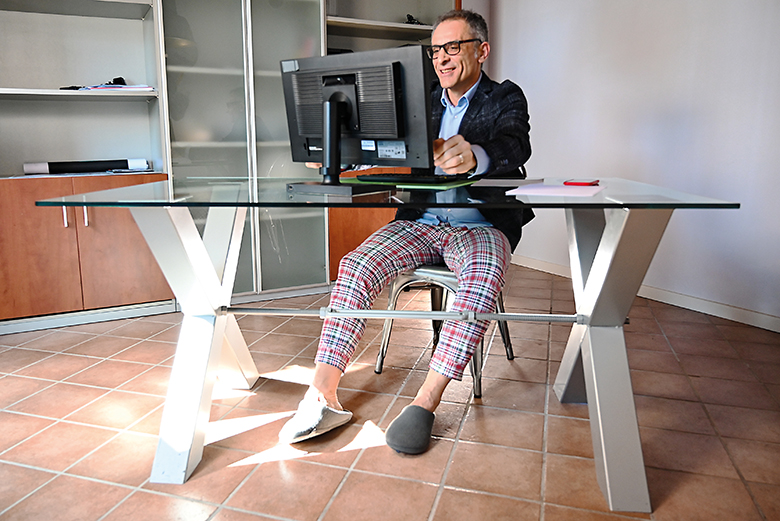- Employees wear pyjamas 46 working days a year on average, with 1 in 12 wearing pyjamas every working day
- Managers fume at jogging bottoms, leggings, hoodies and messy hair
- Workers are too casual since the pandemic say bosses
- Gen Z are the smartest: almost half (45%) suit & boot for clients compared to just 15% aged 35+
British workers are dressing down more than ever, according to data from global hiring and matching platform, Indeed.
The survey of over 1,000 workers and 500 employers in the UK found a third (33%) of Brits admit to working in their pyjamas. On average staff wear pyjamas while working 46 times a year with one in 12 workers wearing pyjamas every working day.
Nearly half the surveyed employers say since the pandemic, workers have taken casual work dress too far. And 29% say they have enforced a strict dress code or would if they could.
Employers label pyjamas as the most inappropriate work appearance, followed by unwashed or messy hair. 44% of employers say jogging bottoms or leggings are inappropriate workwear, yet 56% of staff are donning them while working. Two in five employers say trainers are inappropriate attire but almost two-thirds of staff wear them while working.
Youth dress for success while boomers dress down
Generation Z (Gen Z, 18 to 24-year-olds) appear the keenest to impress: 42% dress in professional business attire, for example, suits, in front of clients versus 15% of those aged over 35. Similarly, one in five Gen Z workers dress more formally than the dress code when meeting stakeholders. This figure steadily declines as the age of workers rises, reaching just 10% for those aged over 55.
22% of Gen Z workers wear professional clothing in the office, double that of 25 to 34-year-olds (11%), with only 9% of those aged over 35 doing the same. When in the office with colleagues, 18% of Gen Z dress more formally than the dress code, declining to 6% of those doing so aged over 55.
Times are changing
Employers say employees' work attire has become more formal since the pandemic, during face-to-face meetings with clients and stakeholders, but less formal with colleagues.
More than half (53%) of workers admit to having worn something scruffier on their bottom half and something smarter on their top half while attending work video calls from home. Meanwhile, three in five female employees ditch makeup when working from home.
Employers are willing to be flexible. 86% of employers also feel that it is important for staff to express their identity through their style and clothing at work. The majority (75%) of employers say dressing more casually at work has become more acceptable throughout their career and have seen the following become more acceptable as work attire: trainers (52%), jeans (52%) and facial piercings (48%).
Tattoo taboo waning
Tattoos have become more commonplace in the workplace, with two-thirds (67%) of employers saying employees having tattoos has become the norm. Over half (52%) of employers feel visible tattoos have become more acceptable throughout their career and the majority (66%) say that tattoos are now unlikely to affect a hiring decision. While fewer workers and jobseekers (40% and 59%) say the same, indicating employees still feel a level of bias.
Danny Stacy, UK Head of Talent Intelligence at Indeed, said: “Workplace norms have changed since the pandemic, affecting how people present themselves. It’s encouraging to see the majority of employers now recognising the importance of staff self-expression. Workers feeling empowered to dress with autonomy not only encourages a greater sense of belonging, and helps to attract and retain diverse talent, it also helps them do their best work. Three-quarters of staff say that it’s important to be able to express their identity through their dress at work, with the lead reason being it makes them more productive as they feel more comfortable.
“But what’s clear though is that many employers still feel there is a line that must be drawn when it comes to just how comfortable their staff can be. Employees should take their cue from their organisation’s culture, and as the research indicates, from the city slickers of tomorrow, Gen Z, who readily smarten up for clients and colleagues.”








